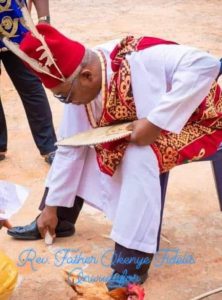When you go into a man’s house and behold Ọkwa nzu or nzu, do not be afraid. They are not idolatory tools. Reverend Fathers have also been observed performing itụ nzu showing that it is not a demonic or fetish practice.”
By Uche Nworah
Nzu or kaolin is a white chunky chalk that normally adorns the home or Obi of a title holder in Igboland. Some people chew it for medicinal purposes. However, in Igboland, nzu is mostly known for its uses when the kolanut protocol or other native Igbo traditional protocols are being observed.
In the olden days, it is said that anybody that rubs nzu on his body will not be kidnapped because since the person just left somebody’s house, it will be easy to trace the person’s movement based on the markings he must have made on the floor with nzu at the last place he visited.
In Igboland, women do not mark nzu on the floor like men, rather they take it up and rub on their body.
Nzu protocols are usually observed in the Obu. Each person has a distinct way of making the markings on the floor with nzu (ika nzu). This also helps to prevent kidnapping as visitors can easily identify the nzu marks made by a man.

Nzu signifies purity, peace and clean heart. It is also used to welcome visitors to one’s house. In making the distinct markings on the floor with nzu, each person says a prayer or makes a wish, just like is done while breaking the kolanut. The men in the gathering take turns in making the markings on the floor and saying the prayers. The prayers are usually protective prayers for one’s family and requests from Chi for good fortunes. Nzu is not handed over, rather it is thrown on the floor for the next person to carry out his own marking.
It is the presenter of nzu or host that starts the nzu protocol, and then throws it on the floor to the next person seated on his right, and so on. Nzu is presented and preserved in Ọkwa nzu which could be carved out of wood or made of clay. Ọkwa nzu may also contain kolanut, alligator pepper, bitter kola etc.
When you go into a man’s house and behold Ọkwa nzu or nzu, do not be afraid. They are not idolatory tools. Reverend Fathers have also been observed performing itụ nzu showing that it is not a demonic or fetish practice.
In order of protocols, nzu rites are performed first before the kolanut protocol. There is nothing fetish about nzu. It is a cultural practice based on the belief system of Ndigbo. It is just another way Ndigbo commune with God when they gather together. In cases where the kolanut is not readily available, nzu suffices.
● Nworah, PhD, a culture enthusiast, is a former Managing Director of the Anambra Broadcasting Service (ABS).